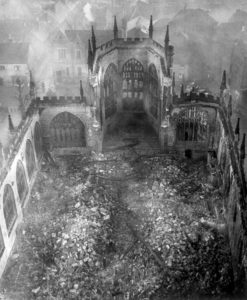 “It is not a requiem to console the living. Sometimes it does not even help the dead to sleep soundly.” – The Times
“It is not a requiem to console the living. Sometimes it does not even help the dead to sleep soundly.” – The Times
There are some pieces in the classical repertoire that are truly monumental, and the chances to perform them are few and far between. Benjamin Britten’s War Requiem is one of those pieces. In 1940, the medieval cathedral of St. Michael in Coventry was bombed and all that remained was a shell. Britten was in the U.S. at the time, but returned to England in 1942, taking the risk of crossing the Atlantic during wartime to be in his own country again. When the time came for the opening of the new Coventry cathedral which stands adjacent to the old one, Britten was commissioned to write a new work.
As anyone who lived through war, Benjamin Britten had much to mourn, and much to protest, as did Wilfred Owen, the English poet whose poems are set, juxtaposed (and sometimes interspersed) with the Latin words of the Requiem, the mass for the dead. Wilfred Owen was a young soldier whose poetry was barely recognized during his short life – only four of his poems were published while he was alive – but since, he has become known as the foremost poet of the First World War. In a draft of the preface to a book he hoped would be published, he wrote:
This book is not about heroes. English poetry is not yet fit to speak of them. Nor is it about deeds, or lands, nor anything about glory, honour, might, majesty, dominion, or power, except War. Above all I am not concerned with Poetry. My subject is War, and the pity of War. The poetry is in the pity. Yet these elegies are to this generation in no sense consolatory. They may be to the next. All a poet can do today is warn. That is why the true Poets must be truthful.
He died in November of 1918 during battle, one week before the Armistice. His family heard the news one hour after peace was declared.
Wilfred Owen’s poems are set with chamber orchestra, while the Latin mass is accompanied by large orchestra. The poems and mass most often alternate in stark contrast, although at times, the poems and mass overlap, as in the Agnus Dei when Owen’s “At a Calvary Near the Ancre” is interspersed between lines of Latin. This poem references a scene of Golgotha at a crossroads in France. The first two lines: “One ever hangs where shelled roads part./ In this war He too lost a limb.”
The Times wrote about the piece before it was performed, “Any new requiem setting has to compete with Verdi’s and Faure’s and Mozart’s treatment of the same words. Britten has approached the task in his own fresh and deeply felt way. It is not a requiem to console the living. Sometimes it does not even help the dead to sleep soundly. It can only disturb every living soul. For it denounces the barbarism more or less awake in mankind with all the authority that a great composer can muster. There is no doubt at all, even before next Wednesday’s performance, that it is Britten’s masterpiece.”
If you are within reach of Philadelphia this week, take the opportunity to hear the Philadelphia Orchestra conducted by Charles Dutoit this Thursday, Friday or Saturday at the Kimmel Center. Featuring Tatiana Pavlovskaya, soprano; Steve Davislim, tenor; Matthias Goerne, baritone; The Westminster Symphonic Choir and the American Boychoir. You won’t regret it!
